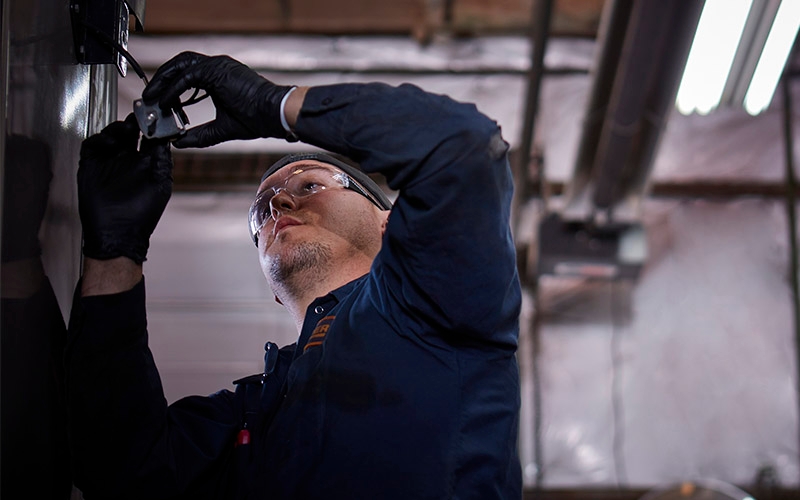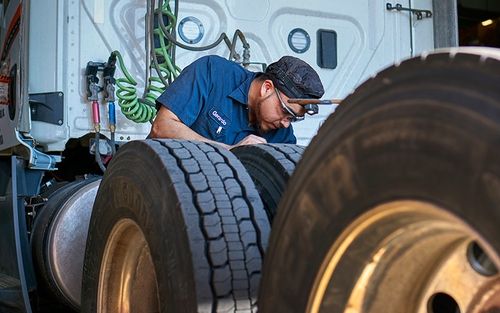Estimated reading time: 4 minutes
Before you become a diesel technician, it’s important to understand what someone in the role does. Once you know what responsibilities come with the job, you can decide if being a diesel technician is a good career for you.
Schneider employs skilled diesel technicians to maintain and repair our large fleet of semi-trucks. Our maintenance team plays a key role in ensuring our business runs smoothly.
There’s no easy way to answer the question, ‘what is a diesel technician?’ because their responsibilities and day-to-day tasks vary greatly from company to company. To make things simple, we listed six common diesel technician responsibilities and explained what their work environment is like, regardless of what type of diesel technician they are.
What does a diesel technician do?
1. Complete inspections.
Diesel technician duties include annual inspections on diesel-powered vehicles, according to manufacturer and company guidelines, to ensure they are operating at full performance.
Systems diesel technicians inspect include:
- Fuel.
- Engine.
- Transmission. Electrical.
- Brakes.
- Steering.
- HVAC.
- Drivelines.
- Tires.
2. Do preventative maintenance.
Preventative maintenance is key to avoiding unexpected repairs and costly breakdowns.
While doing preventative maintenance, a diesel technician may:
- Check the truck’s fluid levels.
- Do oil changes.
- Replace worn-out filters.
- Rotate tires.
- Check tire pressure.
3. Identify and diagnose mechanical issues.
When a vehicle has a mechanical problem, it’s up to the diesel technician to examine the equipment to pinpoint the cause of the issue and figure out how to fix it.
Diesel techs use different outlets to research problems and find solutions, including:
- Parts reference materials.
- Diagnostic software.
- Specialized tools.
- More experienced technicians.
4. Perform minor and major repairs.
Whether a vehicle has an electrical malfunction or was damaged in an accident, diesel technicians are responsible for restoring the equipment back to a safe operating condition.
A diesel technician may perform repairs such as:
- Replacing or repairing faulty parts and components.
- Overhauling the engine.
- Replacing the transmission.
5. Communicate with customers.
Often, diesel technicians must talk with the person who uses or owns the equipment that needs to be worked on. This conversation is vital for gathering information about how the equipment is malfunctioning, so they can better figure out what’s wrong with it.
Diesel technicians also need to communicate things to customers like:
- What repair(s) they recommend.
- Why they recommend making the repair(s).
- How long the repair(s) may take.
- When the repair(s) are completed.
6. Use technology.
There’s no doubt being a diesel technician is physically demanding and requires using a variety of tools to get the job done. However, technology is transforming the way diesel technicians work.
From using advanced software for diagnostics to participating in ongoing training, diesel techs use technology to streamline processes and increase the efficiency of their work.
What are diesel technician working conditions like?
Diesel technician working conditions vary depending on their role and the company they work for.
The average diesel technician works full time at about 40 hours each week. They can also often pick up overtime hours if they want.
Most diesel technicians work in a shop alongside other team members. However, some technicians travel offsite to work on equipment. For example, Schneider's mobile diesel technicians work outside the shop performing repairs at customer sites, distribution centers and rail yards.
A technician may be exposed to several potentially hazardous conditions on a day-to-day basis, including flammable materials and live electrical wiring. That's why safety is a top priority in a shop environment.






